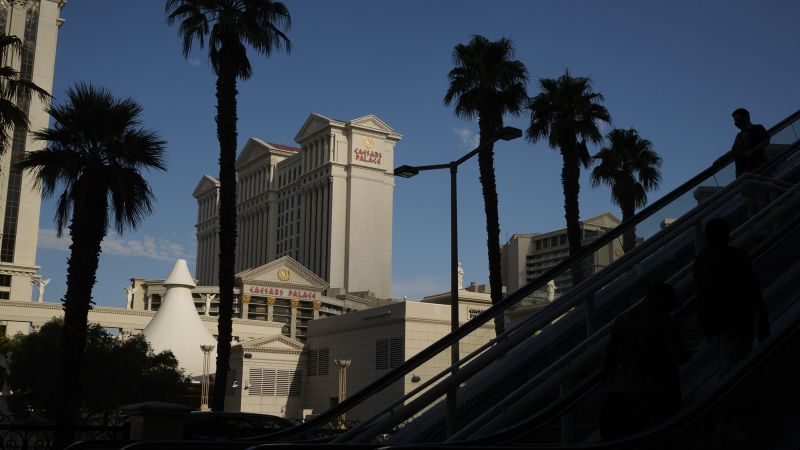The FBI has determined that the $41 million hack of crypto gambling site Stake was carried out by North Korean hackers Lazarus Group, who have stolen over $200 million in cryptocurrency this year.
MGM Resorts International has experienced a cybersecurity issue, resulting in the shutdown of its main website and online reservations, prompting an investigation into the incident.
Several major hotels in Las Vegas, including the Bellagio, experienced a cyberattack that resulted in faulty door locks, inoperable slot machines, and disruption of key hotel systems, prompting an ongoing FBI investigation.
Over a dozen MGM Hotels & Casinos have shut down operations after a cyberattack on its computer systems, causing outages and impacting guests' ability to access rooms, use ATMs, and charge items to their rooms.
The cyber attack on MGM Resorts International, which began on Sunday, has caused significant disruptions and financial losses for the casino and hotel giant, with a Russia-linked hacker gang claiming responsibility for the breach.
Hackers known as Scattered Spider have demanded a ransom from MGM after hacking the company and causing disruptions, and it is believed that the same group hacked Caesars before, receiving a large sum of money as ransom; these hackers are known for their aggressive tactics and have been involved in compromising at least 60 entities worldwide.
The Nevada Gaming Control Board is monitoring a cyber attack on MGM Resorts, which has impacted the experience for casino visitors for three days.
A ransomware group called ALPHAV, also known as BlackCat, has taken credit for a massive cyber breach at MGM resorts, causing disruption to various functions including guest key cards, slot machines, and credit card transactions, while the company is working to resolve the issue.
MGM Resorts is facing a widespread outage lasting four days after a cyberattack by the hacking group Scattered Spider, with guests reporting disruptions to various services including ATMs, slot machines, digital key cards, and electronic payment systems, while entertainment giant Caesars Entertainment also suffered a cyberattack attributed to the same group, resulting in stolen data and a demanded ransom of $30 million.
Prominent casino chain MGM Resorts experienced a cyberattack that shut down many of its systems, likely due to a social engineering technique known as vishing, highlighting the vulnerability of even well-protected organizations to human-based attacks.
A cybersecurity breach at MGM Resorts in Las Vegas has led to unauthorized charges on loyalty accounts and concerns over stolen information, prompting increased credit monitoring by affected customers.
The recent cyberattack on MGM Resorts and the payment of ransom by Caesars Entertainment highlight the evolving methods used by cyber criminals to target casinos, emphasizing the need for constant evolution of security systems and protocols in the gaming industry.
Hackers responsible for breaching MGM Resorts and Caesars Entertainment have also targeted three other companies in the manufacturing, retail, and technology sectors, according to a security executive familiar with the matter.
A recent cyberattack targeted MGM, disrupting its Las Vegas locations, but customer-facing electronic systems have now been restored after 10 days of being faulty.
A hacker stole customer information from crypto data firm Nansen by breaching a third-party vendor, exposing the personal information of 6.8% of users, including email addresses, password hashes, and blockchain addresses.
A new gang on the dark web called Ransomed.vc claims to have breached all of Sony's systems in a ransomware attack and is selling the stolen data.
A new hacking group claims to have compromised Sony's systems and is selling the data after the company refused to pay, while another threat actor leaks the data and accuses the first group of being scammers.
Sony Interactive Entertainment has notified current and former employees and their families about a cybersecurity breach that exposed personal information, with the intrusion occurring after an unauthorized party exploited a zero-day vulnerability in the MOVEit Transfer platform, resulting in the compromise of sensitive information belonging to 6,791 people in the U.S.
The cyberattack on MGM Resorts in Las Vegas resulted in the company losing approximately $100 million, highlighting the significant financial impact major companies face when targeted by hackers.
Cyberattack on MGM Resorts expected to cost at least $100 million, impacting the company's third-quarter earnings, but cyber insurance is expected to cover the financial impact; personal data of customers, including social security numbers and contact details, was stolen, but no evidence of compromised financial information or passwords; cybercrime group Scattered Spider claimed responsibility for the attack.
Multiple companies, including Johnson Controls, Clorox, and MGM Resorts, have recently experienced significant cybersecurity breaches, resulting in financial losses and operational disruptions, highlighting the ongoing issue of cyberattacks affecting various industries.
MGM Resorts International has disclosed that the cyberattack it experienced in September will cost $100 million and result in adjusted property losses for its Las Vegas Strip Resorts and regional operations. The company will also provide identity protection and credit monitoring services to individuals whose personal information was compromised in the breach.
MGM Resorts International did not pay the ransomware attackers who breached its systems, resulting in the shutdown of hotels and casinos, with customer data including personal information potentially compromised, although no passwords, bank account numbers, or card details were believed to have been stolen.
Hackers stole and posted for sale the data of 23andMe users, using a technique called "credential stuffing" to guess logins and gather more information through an opt-in feature, with a particular focus on Ashkenazi Jews and users of Chinese descent, although the sample data has not been verified by the company.
